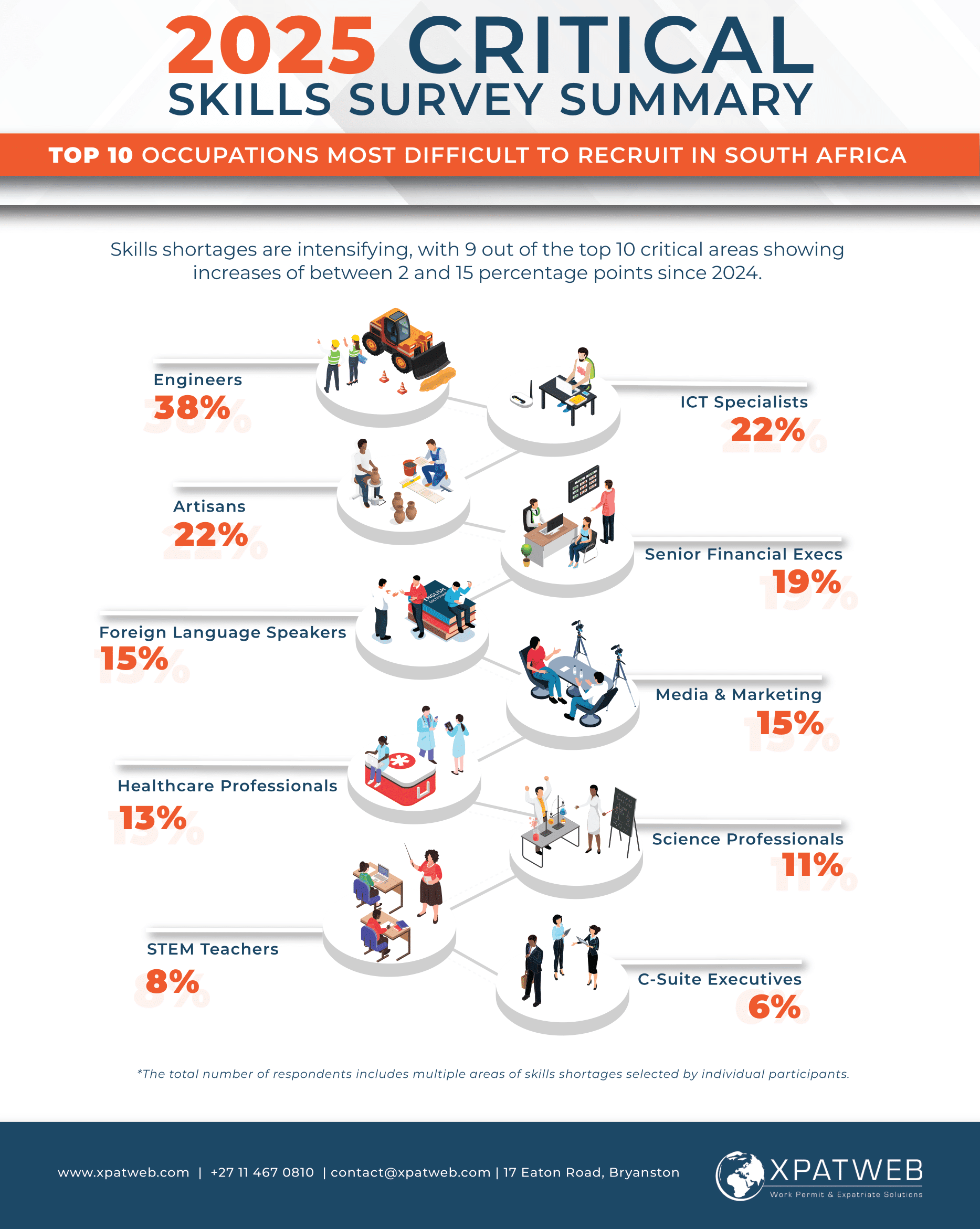FEATURED IN
According to Marisa Jacobs, Managing Director at Xpatweb, the findings of the 2025 Critical Skills Survey, released today [28 October 2025], reveal that 84% of large corporations and multinational companies experience challenges in sourcing highly skilled talent, a jump from 79% in 2024.
The 10 most difficult roles to fill remain largely unchanged from 2024. Occupations such as engineers, ICT specialists, artisans, financial professionals and foreign language speakers continue to dominate the list.
The findings are based on responses from 381 employers, including JSE-listed companies and international groups operating in South Africa. The survey is recognised as the most comprehensive of its kind among verified employers and is Xpatweb’s biggest survey to date.
Global Forces Fuel Local Pressures
The World Economic Forum’s 2025 Future of Jobs Report identifies AI, big data, cybersecurity, and digital literacy as the fastest-growing skill areas over the next five years. Jacobs says South Africa’s skills shortages mirror global shifts.
The majority of survey participants recognise the importance of global hiring:
- 84% say international recruitment is essential to meet business needs, although 77% cite some difficulties with the work visa process;
- 82% indicate the occupations on the National Critical Skills List cater fully or to some degree for their business needs.
The list underpins the Critical Skills Work Visa system which is instrumental in streamlining and expediting the process for companies to recruit qualified foreign workers to South Africa. It is therefore crucial that the list accurately reflects the current skills gaps experienced by businesses, says Jacobs.
It must also be updated regularly. In previous years, the survey findings have, in collaboration with the Department of Higher Education and Training (DHET) and the Department of Home Affairs (DHA) helped shape the National Critical Skills List.
The next revision of the list is expected in 2026 and will again draw on data from this survey.
Delving Into the Worsening Skills Shortages
Jacobs notes that while demand for executive leadership roles shows a slight decline in 2025, shortages in technical and digital fields have intensified sharply. This reflects both domestic capacity constraints and broader global trends.
The deepening crunch is evident: 9 out of the top 10 critical areas show increases of between 2 and 15 percentage points year-on-year.
Wanted: Engineers
Among the most alarming increases is in engineering. In 2024 almost 23% of respondents struggled to find engineers – ranging from maintenance and industrial engineers to mechanical engineering technicians and electrical engineering technologists. In 2025, that figure has surged to 38%, marking a dramatic rise from 2018, when only 14% reported difficulty in attracting engineering talent.
Where Are the ICT Specialists?
Currently, 22% of survey participants have a shortage of ICT specialists, up from 14% in 2024 and just 10% two years ago. The most in-demand ICT roles include data analysts, data scientists, software engineers, and IT engineers.
Artisan Scarcity
Artisan roles saw one of the steepest year-on-year increases. In 2024, 10% of companies struggled to hire artisans; in 2025, that figure has risen to 22%. The most sought-after trades include electricians, millwrights, automation specialists, and instrumentation specialist artisans.
High Demand in Healthcare
The demand for healthcare professionals is also on the rise. Registered nurses are especially hard to recruit, alongside a wide range of medical specialists including public health experts, emergency medicine doctors, anaesthetists, and cardiothoracic specialists.
Media and Other Pain Points
Shortages are also growing in professional categories such as senior financial executives, media and marketing professionals (including brand managers, creative designers, media strategists, and digital analysts), and foreign language speakers, particularly those fluent in French (16%), German (15%) and to a lesser extent Spanish and Mandarin (10%).
Science professionals are also becoming harder to find, with 11% of respondents citing persistent vacancies, up from 9% in 2024. Within this group, food scientists (16%) and actuarial scientists (9%) are scarce.
Trusted Employer Scheme Delivering Promising Results
Introduced by DHA, the Trusted Employer Scheme (TES) aims to fast-track visa applications for qualifying companies when hiring foreigners.
80% of Trusted Employer Scheme (TES) participants report improved visa processing for foreign employees.
According to Jacobs this is encouraging as the TES is designed to streamline work visa applications for companies that meet specific criteria, reducing paperwork, and speeding up mobilisation of international talent.
Unfilled Roles Are Hurting Business
It is crucial for the South African economy as a whole and individual businesses to attract and hire foreign professionals without undue delays to ensure smooth business.
Currently an overwhelming 89% of employers say unfilled critical skills roles are negatively affecting operations, from lost productivity and delayed projects to missed growth opportunities.
While over 80% say international searches would help, the immigration system still causes bottlenecks. Delays at South African embassies or VFS centres, and professional registration requirements are frequently cited as problematic.
The Global Mobility Reality,
Jacobs notes that more than 300 million people worldwide are currently living outside their country of birth. According to the United Nation’s report International Migrant Stock 2024 this is about 3.6% of the global population. Data by the International Labour Organisation shows over half of them are foreign workers and professionals.
For highly skilled and globally mobile professionals, the first impression of a new country often begins with the visa application and immigration process. This experience sets the tone for how welcomed and supported global talent feels and it is where expert immigration support can significantly help shape the overall employee experience, she adds.
In today’s highly competitive and borderless labour market, businesses must adopt a proactive approach to immigration to secure the talent that drives innovation and success. For South Africa, the ability to attract, integrate, and retain mobile professionals from abroad, remains critical to sustaining economic competitiveness and long-term development.
Herewith a visual of the top 10 occupations most difficult to recruit in South Africa












